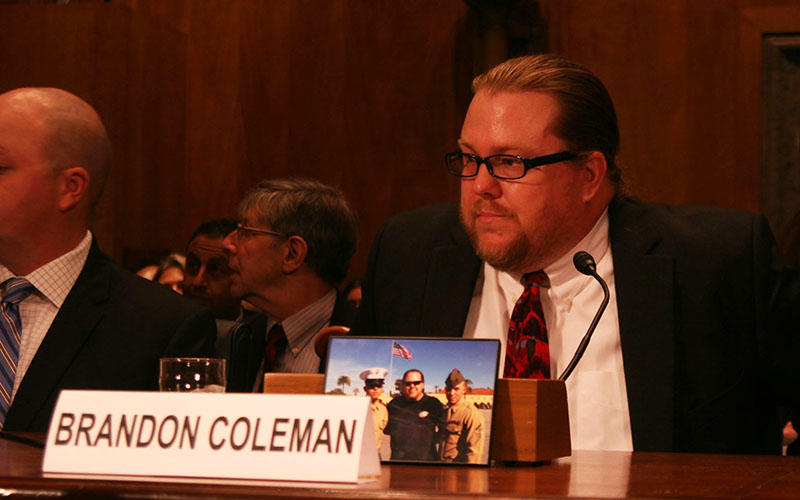
Brandon Coleman was put on leave from his job at the Phoenix Veterans Affairs hospital after he complained about its care for suicidal vets. He and other whistleblowers testified to a Senate panel about VA retaliation. (Photo by Tom Blanton)

Sen. John McCain, R-Arizona, said he and others on the Senate Homeland Security and Governmental Affairs Committee would do “everything we can” to hold VA officials accountable for retaliating against whistleblowers. (Photo by Tom Blanton)
WASHINGTON – Brandon Coleman was an addiction therapist at the Phoenix VA hospital in December when he raised concerns about the care of suicidal veterans, who he said were often allowed to walk away from the facility.
“During my time at the Phoenix VA, I lost six veterans to suicide,” Coleman said. “Each one was like a punch in the gut.”
But he got another punch in the gut after he complained about the problem, and then appeared in news stories about it: Coleman was placed on administrative leave by the Department of Veterans Affairs in January and barred from the hospital without an escort. He has been fighting to get his job back since then.
Coleman was one of four VA whistleblowers who testified Tuesday to the Senate Homeland Security and Governmental Affairs Committee as it investigated VA accountability in its handling of those workers who step forward.
Sen. John McCain, R-Arizona, said he and other committee members were all dissatisfied with the agency’s responses and “will do everything we can” to hold the VA officials accountable for claims that they retaliated against whistleblowers.
“We have to stop this,” McCain said during the three-hour hearing.
Problems at the troubled agency first surfaced in early 2014, when whistleblowers said officials at the Phoenix facility were doctoring records to make it look like vets got timely appointments. In fact, patients often waited months for an appointment, if they got one at all.
The investigation soon expanded nationwide, uncovering lavish bonuses and a pattern of doctoring records, among other problems that led to the resignation of Secretary Eric Shinseki in June 2014.
Since then, Congress has given agency officials greater authority to fire or discipline administrators. But when askedÿTuesday, VA officials at the hearing were not able to say how many people had been fired for retaliation against whistleblowers.
Linda Halliday, deputy VA inspector general, conceded that the agency has been taking too long to hold administrators accountable for retaliating against whistleblowers. But she said the agency is “definitely trying to change the culture to make sure we reward whistleblowers when they come forward.”
But Halliday also pointed to what she called “a serious discrepancy between the size of our workforce and the size of workload.” She said the VA receives about 42,000 complaints annually, which another official on the panel said accounted for 35 to 37 percent of all complaints to the federal government.
Whistleblowers at the hearing were blunt in their criticism of the agency.
“The VA deceit, deception and lies have gone on long enough,” said Shea Wilkes, who worked as a licensed clinical social worker at the VA hospital in Shreveport, Louisiana, before speaking out against the agency. “Their PR machine puts out more propaganda than the Republic of North Korea.”
Senators also appeared unimpressed with answers by agency officials, with nearly all of the committee members there calling for greater accountability within the organization, and many saying changes should be made at the top.
Sen. Ron Johnson, R-Wisconsin, assured Coleman and the other whistleblowers that the hearing “is going to result in concrete action.”
“This isn’t just talk,” said Johnson, the chairman of the committee. “There’s nothing more corrosive to an organization than allowing bad apples to retaliate and get away with it.”
Coleman said actions against the retaliatory administrators in the agency couldn’t come soon enough.
“That’s what we’re here for today,” he said during the hearing. “To get some teeth in the process.”
– Cronkite News video by Elizabeth Blackburn